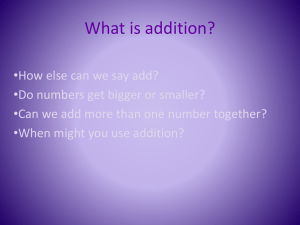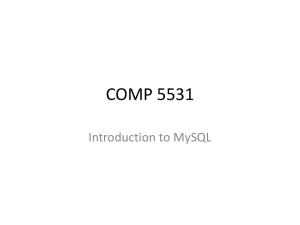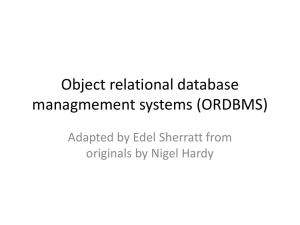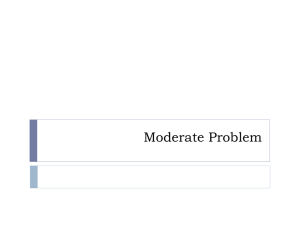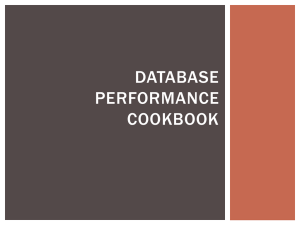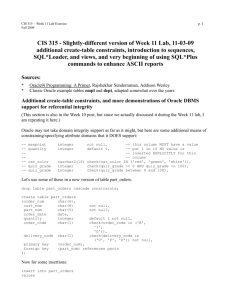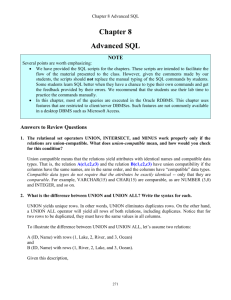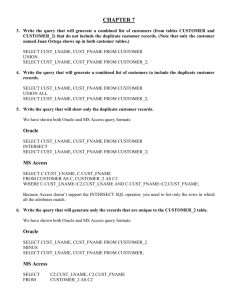Lecture 2
advertisement
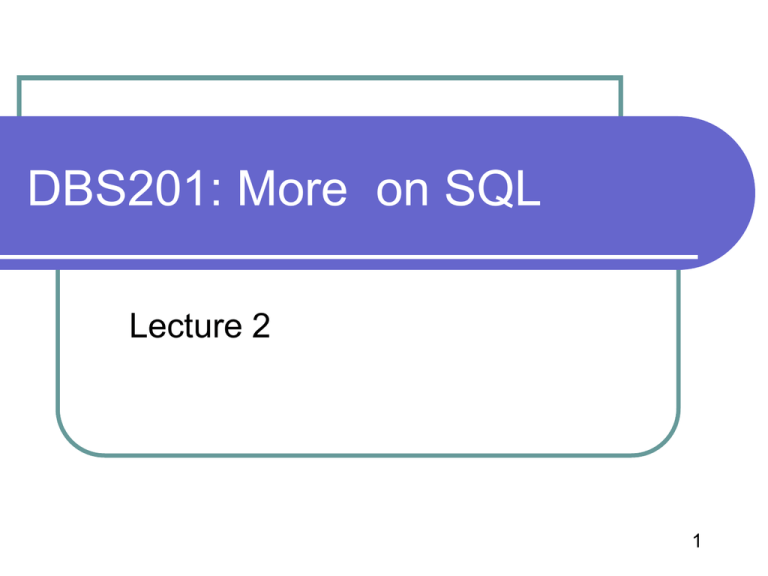
DBS201: More on SQL
Lecture 2
1
Agenda
Review
How to create a table
How to insert data into a table
Terms
Lab 2
2
Review
Data Anomalies
What is a database? What is a DBMS?
What are three categories of SQL statements
Use three letters to describe each category
On IBM i platform
What command is used to initiate an interactive SQL
session?
How do you construct a container for Tables and Views
A collection is also called two other names - ?
3
How to Create a Table
First write a Database Structure chart.
We can also call this a Data Dictionary of
your table.
Column
Type
Length
PK
FK reference Req’d
?
Unique
?
Validation
4
How to Create a Table
Type:
Numeric
Decimal
Character
Varchar
Date
‘yyyy-mm-dd’
Do not specify a length
Time
Length:
Specify positions to the left of the decimal point and
positions to the right of the decimal point
5
How to Create a Table
Primary Keys
For concatenated Primary Keys, pay close attention
to the order of the attributes within the Primary Key
Indexing starts with the first attribute mentioned,
then proceeds to the next attribute and so on
PK:
Specify ‘Y’ if this column name is a part of the PK,
otherwise leave blank
6
How to Create a Table
FK Reference:
Specify the table name and the column name
where this field is a PK
Req’d?:
PKs, by default are required
If this column must be present, specify ‘Y’
Means that this column can not be left blank or
NULL – enforces data integrity
7
How to Create a Table
Unique?:
Means only that the value can only appear once in
this column
Validation:
Specify the range of values or the specific values
that are allowed for this column
8
Definition of a Table
Format for defining the table PAINTER:
Column
Type
Len
PK
Req’d
Unique
Y
Y
PTR_NUM
CHAR
4
PTR_LNAME
CHAR
15
Y
PTR_FNAME
CHAR
15
Y
PTR_CITY
CHAR
20
DEC
10
PTR_PHONE
Y
FK
Validation
9
Creating a ‘Database’
CREATE COLLECTION
Used to create a ‘database’
Syntax
CREATE COLLECTION ‘database name’
10
Deleting a ‘Database’
To remove a ‘database’, use the DROP
COLLECTION statement
Syntax
DROP COLLECTION ‘database name’
11
Creating Tables in SQL
CREATE TABLE
Used to create a table
Syntax
CREATE TABLE tablename
(field1 datatype fieldsize,
field2 datatype fieldsize, ….
CHECK …,
PRIMARY KEY (fieldname(s)),
FOREIGN KEY (fieldname) REFERENCES
tablename (PKfieldname))
12
Creating Tables in SQL
Create statement for painter might look like:
CREATE TABLE painter (
p_num
char (4) not null with default primary key,
p_lname
char (15) not null with default,
p_fname
char (15) not null with default,
p_city
char (20),
p_phone
dec (10))
13
Creating Tables in SQL
Use this version on tests and exam
CREATE TABLE painter (
p_num
char (4) not null with default,
p_lname
char (15) not null with default,
p_fname
char (15) not null with default,
p_city
char (20),
p_phone
dec (10),
Constraint
Painter_p_num_PK
Primary Key (p_num) )
14
Creating Tables in SQL
Primary Key Constraint initially not done:
Table created without a primary key constraint
p_phone
dec (10) )
ALTER TABLE PAINTER
ADD CONSTRAINT PAINTER_p_num_PK
PRIMARY KEY (p_num)
15
Dropping Tables in SQL
DROP TABLE
Used to remove a table
Syntax
DROP TABLE tablename
16
Inserting Data into a Table
INSERT
Used to insert data into a table
Syntax
INSERT INTO tablename (fieldname1,
fieldname2,….) VALUES (value1, value2…)
or
Single row added
INSERT INTO tablename VALUES (value1,
value2…), (value1, value2…)
Multiple rows added
17
Inserting Data into a Table
Rules for Inserting:
Include all column names and provide values for
each column
Or Ignore column names and provide values in the
same order as column names
If table was created allowing NULLs, then indicate
the word NULL in place of that column when
specifying the values
18
Primary Keys in SQL
Primary Key
Primary Key must always be NOT NULL
(and unique)
What happens if you create the table
without specifying a primary key, insert
rows and then apply the primary key
constraint?
19
Inserting a Row
INSERT INTO PAINTERA40/PAINTER
VALUES('111', 'Smith', 'Bill', 'Oakville',
905477333)
INSERT INTO PAINTERA40/PAINTER
VALUES('222', 'Brown', 'Nancy',
'Mississauga', 9055666633)
20
Inserting Data into a Table
INSERT INTO PAINTERA40/PAINTER
(p_num, p_lname, p_fname, p_city, p_phone)
VALUES('111','Wong', 'Ben', 'Newmarket',
9058876644)
Can we add the primary key constraint ?
ALTER TABLE PAINTER
ADD CONSTRAINT Painter_p_Num_PK
PRIMARY KEY (P_Num)
Unique index cannot be created because of
duplicate keys.
21
SQL Terminology
SCHEMA
A group of related objects that consists of
a library, a journal, a journal receiver, an
SQL catalog, and an optional data
dictionary.
A schema enables the user to find the
table, view and index objects by name.
Another name for a schema is collection.
22
SQL Terminology
TABLE
A set of columns and rows.
ROW
The horizontal part of a table containing a
serial set of columns.
COLUMN
The vertical part of a table of one data type
23
Equivalent SQL Terminology
LIBRARY
A group of related objects that enables the
user to find the objects by name.
A schema is treated the same as a library
by some native commands.
PHYSICAL FILE
A set of records.
A Table is treated the same as a Physical
File by native and SQL commands
Equivalent SQL Terminology
RECORD
A set of fields.
FIELD
One or more bytes of related information of
one data type.
In SQL this is referred to as a column.
25
PART Table – What can you identify?
PART
NUMBER
PART
DESC
ON
HAND
CLASS
WAREHOUSE
104
HW
3
23.95
PRICE
AX12
Iron
AZ52
Dartboard
20
SG
2
12.95
BA74
Basketball
40
SG
1
29.95
BH22
Cornpopper
95
HW
3
24.95
BT04
Gas Grill
11
AP
2
149.99
BZ66
Washer
52
AP
3
399.99
CA14
Griddle
78
HW
3
39.99
CB03
Bike
44
SG
1
299.99
CX11
Blender
112
HW
3
22.95
CZ81
Treadmill
68
SG
2
349.99
26
Table Exercise 1:
Create a table called AGENT using the following data
dictionary:
Column
Len
AGT_NUM
CHAR
3
AGT_LNAME
CHAR
25
Y
AGT_FNAME
CHAR
20
Y
AGT_AREACODE
CHAR
3
AGT_PHONE
CHAR
7
PK
Y
FK
Req’d
Type
Unique
Validation
Y
Insert the following data into your table:
AGT_NUM
AGT_LNAME
AFT_FNAME
AGT_AREACODE
AGT_PHONE
5
Andrews
Mark
416
123-3456
10
Chen
Terry
250
333-4059
15
DaSilva
Lila
416
234-5837
20
Edwards
George
416
444-5959
25
Eustace
Gina
519
948-8494
27
Table Exercise 2:
Create a table using the following data dictionary:
Column
CUST_NUM
Type
Len
PK
FK
Unique
Validation
Y
Y
1-100
DEC
3
CUST_LNAME
CHAR
25
Y
CUST_FNAME
CHAR
20
Y
CUST_AREACODE
CHAR
3
AGENT_NUM
CHAR
3
Y
Req’d
AGENT
(AGENT_NUM)
Insert the following data into your table:
CUST_NUM
CUST_LNAME
CUST_FNAME
CUST_AREACODE
CUST_PHONE
5
Andrews
Mark
416
123-3456
10
Chen
Terry
250
333-4059
15
DaSilva
Lila
416
234-5837
20
Edwards
George
416
444-5959
25
Eustace
Gina
519
948-8494
28
Agenda
Lab 2
29


